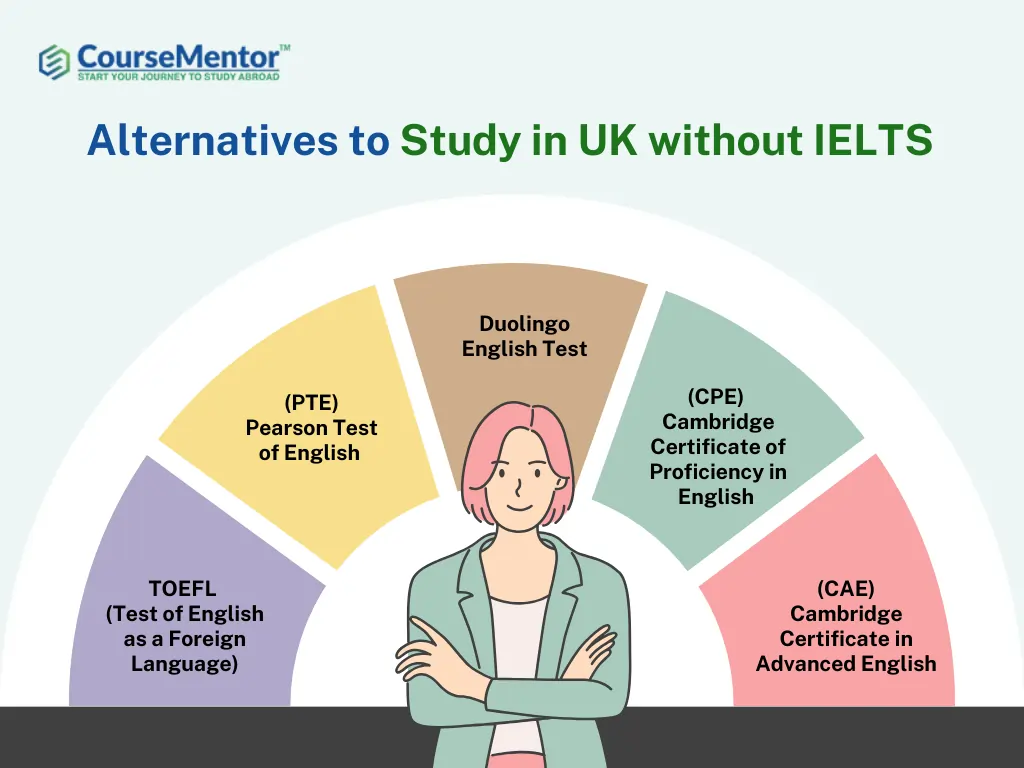Have you ever dreamt of pursuing higher education in the United Kingdom, but the thought of conquering the IELTS test has held you back? What if there was a pathway that allowed you to embark on your academic journey in the UK without the stringent requirement of IELTS scores?
The pursuit of education knows no bounds. Moreover, for those aspiring to study in the UK, the prospect of bypassing the traditional language proficiency hurdle opens doors to a world of possibilities.
In recent times, various institutions in the UK have recognized the diverse linguistic abilities of international students. Moreover, they have introduced alternative measures to assess language proficiency, providing a ray of hope for those who wish to study in UK without IELTS. So, let’s dive into the article.
What is IELTS?
Before discussing whether you can study in UK without IELTS or not. Firstly, let’s briefly understand about IELTS, a standardized test.
IELTS ( International English Language Testing System ) evaluates the English language proficiency of students who desire to study abroad. This test checks students’ language ability in four areas: listening, reading, writing, and speaking.
After evaluating the student’s proficiency, the bands are scored on a scale of 0 to 9. Moreover, those who are experts in any section get high bands in that particular section. After taking this three-hour test, the students get an overall band score that is accepted by various countries to allow international students to study abroad.
Related Article: Best Tips How to Score 8 Bands in IELTS: Cracking the IELTS Code
Is it possible to Study in UK without IELTS?
The first question that comes to the mind of an international student is whether they can pursue their studies in the UK if they don’t appear on the IELTS test or have lower scores.
Yes, it is possible to study in UK without IELTS in certain cases. Many universities and colleges in the UK offer alternative English language proficiency tests or have specific admission criteria that exempt students from providing IELTS scores. Some of these alternatives are mentioned in the image:

So, to demonstrate your English language proficiency, you can use all these alternatives, such as TOEFL, PTE, Duolingo, and other tests. Now, let’s explore how an international student can study in UK without IELTS.
How to Study in UK without IELTS?
As we discussed, Studying in the UK without taking the IELTS (International English Language Testing System) exam is possible through various alternatives and exemptions.
Here are some ways to pursue education in the UK without IELTS:
1. English Proficiency Exemptions
Some universities in the UK may exempt you from the IELTS requirement if you have completed your previous education in English or if English is your first language. Check with the specific university’s admission requirements to see if you qualify for an exemption. If yes, then you can study in UK without IELTS.
2. Alternative English Language Tests
Many universities accept alternative English language proficiency tests such as the TOEFL (Test of English as a Foreign Language) or the Pearson Test of English (PTE). Confirm with your chosen institution if they accept these alternatives. If they accept the other language proficiency tests, you can study in the United Kingdom without IELTS.
3. Pre-sessional English Courses
Some universities offer pre-sessional English language courses for international students. Completing such a course successfully can exempt you from the IELTS requirement, as it demonstrates your ability to study in English at the university level.
4. Work Experience
If you have significant work experience in an English-speaking environment, some universities may consider this as evidence of your English language proficiency. Check with the admissions office to see if your work experience qualifies.
5. Online Interviews
In some cases, universities may conduct interviews during the admission process. A successful interview could prove your English language skills to the authority taking your interview.
By using all the ways mentioned above, you can study in UK without IELTS. But before applying, always check the specific admission requirements of the university and the program you are interested in, as they may vary.
Related Article: How to Study in Australia Without IELTS?
20 Best Universities to Study in UK without IELTS
After discussing the ways through which students can study in UK without IELTS. You should know about various universities that offer students the opportunity to study in the United Kingdom without IELTS.
More than 100 universities offer international students the opportunity to study in the United Kingdom without taking the IELTS exam. Among all of them, the 20 best universities for indian students are as follows:
- York University
- University of Strathclyde
- University of Warwick
- University of Bristol
- University of Birmingham
- London Southbank University
- University of Dundee
- Northumbria University
- University of Bolton
- University of Northampton
- University of Plymouth
- University of Stirling
- Portsmouth University
- Aston University
- Swansea University
- Robert Gordon University
- Riga Technical University
- Sheffield Hallam University
- University of Basel
- University of Geneva
Documents required to Study in UK without IELTS
Now, you are equipped with all the information on how to study in UK without IELTS and the various universities that offer this opportunity to international students. Well, to apply to various UK universities, you are required to show certain documents such as:
- Valid Passport
- Educational Qualifications
- Experience Letter
- CAS letter
- ATAS Certificate (if applicable)
- A sponsorship affidavit if funds are held in the parent’s account
- Medical Certificate from authorized UKVI certifying the medical condition of the candidate
- Financial Proof, including FD Certificates, 3 months bank statements, etc.
With all these documents, you can apply to various universities to study in the United Kingdom with the IELTS requirement. Now, let’s explore the steps to apply to various UK universities.
How to apply to Universities to study in UK without IELTS?
Studying in the UK is an exciting prospect, and if you’re considering applying to universities without taking the IELTS exam, it’s important to understand the alternative pathways available.
Related Article: Unlocking the Ways to Study in USA Without IELTS!
Here’s a step-by-step guide to help you navigate the application process successfully:
1. Research Universities and Courses
Begin by researching universities and courses that interest you. Look for institutions that offer programs exempt from the IELTS requirement. Many universities in the UK accept alternative English language qualifications.
2. Verify English Language Exemptions
Check whether the universities you are interested in have specific exemptions or alternative language proficiency requirements. Some institutions may accept previous academic qualifications in English, while others might consider your work experience or other language tests.
3. Demonstrate English Proficiency through Qualifications
Some universities accept other English language qualifications, such as TOEFL, Cambridge English exams, or Pearson PTE. Ensure you meet the minimum score requirements for these alternatives and submit the relevant documentation.
4. Provide Evidence of Previous English Education
Universities may waive the IELTS requirement if you have completed a degree or academic program in English. Ensure that your academic transcripts clearly state the language of instruction and submit them as part of your application.
5. Secure a Conditional Offer
Once you have submitted your application, universities may issue a conditional offer, specifying that you must fulfill certain English language requirements before starting your program. This could include attending a pre-sessional course or submitting additional documentation.
6. Explore Exemptions for Native English Speakers
If English is your first language or if you have completed your education in an English-speaking country, you may be exempt from the IELTS requirement. Verify with the university whether such exemptions apply to you.
By carefully following these steps and understanding the specific requirements of each university, you can successfully apply to study in the UK without taking the IELTS exam. Good luck with your application!
Final Words
In this article, we have discussed the alternative ways to study in UK without IELTS, such as PTE, TOEFL, Duolingo, etc. The best universities offer international students opportunities to study without the IELTS requirement.
Moving further, the steps for applying to those universities and the documents required for UK universities. I hope you get all the required information. If you want to know more about studying abroad, you can revisit. Till then, to get any free guidance on studying abroad, visa services and career consultancy, you can book a 30-minute free session with our experts.
Frequently Asked Questions (FAQs)
Is it possible to Study in UK without IELTS?
Yes, some UK universities may accept students without IELTS, provided they meet specific language proficiency requirements through alternative qualifications or English-language tests. It’s advisable to check with individual universities for their specific admission criteria.
Can an international student apply for a UK Visa without IELTS?
Yes, in some cases, you can apply for a UK Visa without IELTS. The specific language requirements depend on the type of visa you are applying for, and alternative language proficiency tests may be accepted. Moreover, for applying check the official UK Visa and Immigration website for the most up-to-date information.
How to Study in UK without IELTS?
To study in the UK without IELTS, you can explore universities that offer language proficiency waivers based on criteria such as academic qualifications or medium of instruction in previous education. Additionally, some institutions accept alternative English language proficiency tests like TOEFL or PTE as substitutes for IELTS. In addition, make sure to check specific admission requirements for each university.


